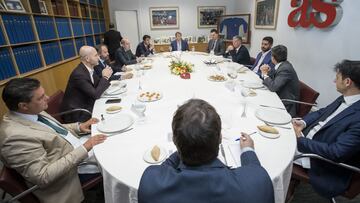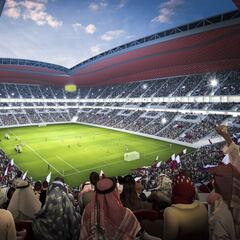“Qatar 2022 expects up to 1.5 million fans, the biggest World Cup ever”
The organisers of the Qatar World Cup 2022 paid a visit to AS to explain their vision for a hyper-connected tournament, where “everything will be within reach of the supporters”.

There’s a little over five years until the start of the World Cup in Qatar, and the organisers already feel it’s getting close. Without doubt, it's far closer than back at the end of 2008 when they started working on the bid, which of course would go on to win.
Naser Al Khater, assistant secretary general, Sakis Batsilas, chief operating officer director and Mattias Krug, chief international press officer, paid a visit to AS, with the happy expectation of those who know they are in charge of something major: "We’re very happy with the progress. We’ve re-opened the first of our stadiums, the Khalifa, and in 2018 we’ll open two more. We think they’ll all be ready by 2020. And it’s not just the stadiums that are coming along well, it’s also all the infrastructure”, says Al Khater.
Qatar 2022 aiming for 1.5 million fans
Dressed in a sharp blue suit, exuding a clear sense of humour and speaking the English he learnt as a student in Boston, Al Khater is optimistic about how the fans will accept their World Cup: “We hope between 1.1 and 1.5 million fans will come. That would be more than Brazil (600,000) and South Africa (500,000) and it would be record. You need to remember that Qatar is just four hours from a number of cities in India with more than two million inhabitants, and China is close too. This World Cup will be different to previous tournaments. It will be an opportunity to introduce Arab culture to the world and counteract negative stereotypes”.
Qatar 2022: November to December
The 2022 World Cup will be the first to be held in the autumn (from 21 November to 18 December), which will require changes to the footballing calendar: “It was FIFA who decided the dates, not us. All the major leagues agreed with the change. The heat? In Brazil, it was nearly 40 degrees in Fortaleza. Qatar will have air conditioned stadiums, but in November and December that won’t be necessary. Cooling technology is advancing in every sector, not just sport. The final of the Emir Cup was held in Doha a few months back and it was 41 degrees outside, and 19 degrees in the stadium”, says Al Khater. “One important thing about this World Cup is that by playing in the middle of the season the players will be coming when they are in great condition. They won’t be travelling a long way and they won’t be tired. We only need a bit of luck for this to be an incredible World Cup”.
There’s another thing that makes Qatar stand out: convenience. “The teams and fans won’t have to travel inside the country or change hotels during the tournament, because everything is so close. In fact, technically you could watch three games in a day. The metro, which is planned for 2019 or 2020, will connect all the stadiums, with the exception of Al Khor, which will be connected by buses. When you go to Disney World you want to have everything right by you, well Qatar is like that”, continues Al Khater.
Qatar 2022 legacy
“We’ll have eight or nine stadiums, not more than nine. All of them will be new, with the exception of the Khalifa, which has been renovated. The opening match and the final will be in Lusail. And the legacy plans are already in place: some stadiums will be used by Qatar clubs, while others will be used for other purposes. What happened with some stadiums in South Africa and Brazil won’t happen here. FIFA are currently carrying out inspections every two to three months and they’re very happy with how things are going”.
Another common talking point is alcohol: “There will be alcohol, but in determined locations We want our guests to be happy. But we do think this World Cup will be more family orientated and different to previous tournaments”, explains Al Khater.
Qatar has been much criticised since the announcement that it had won the rights to host the World Cup, with much of the loudest disapproval coming from English-speaking countries: “In general terms public opinion of us has improved. People have started to recognise the efforts we’ve made and the steps we’ve taken. The conditions of the construction workers remains a focus, but people also recognise that we’ve changed the laws to improve the situation. Right now there are 15,000 construction workers involved, with another 400 in the organisation, which will rise to 700”.
The blockade of Qatar led by Saudi Arabia has complicated the situation: “Of course, it’s not helped. Most of our neighbours support the World Cup in Qatar. I’m not talking about the leaders, but the people. We strongly believe sport and politics shouldn’t be mixed”, says Al Khater.
Tourism boost from Qatar World Cup
The tournament is likely to have a major economic impact on the country. “In the coming years, 25% of our economy will come from things other than oil and gas. With the World Cup the tourism sector will grow. People are very excited about the World Cup in Qatar; if the support for the tournament previously was 70% then right now it’s 100%. And we also have the opportunity to grow our reputation as a country.”
Related stories
The security at the World Cup is of course another subject that Al Khater is deeply focused on: “We’re working hard on that aspect. We have periodic meetings with Interpol. And we’re sending 85 people to Russia to see how they do it; the Russians are very strong on security aspects. In November we’ll have the first Major Event Security conference in Doha. Of course we’re taking terrorism seriously, but Qatar hasn’t had a problem in that area, so it's not a bigger issue than any of the other elements. We’re focused on everything that needs to be done to ensure the tournament is a success. We’re very excited to be hosting the World Cup”.

